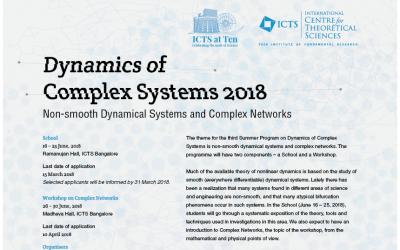This Summer Program on Dynamics of Complex Systems is the third in the series. The theme for the program this year is non-smooth dynamical systems and complex networks.
The study of bifurcations, i.e., qualitative change in the behavior of a dynamical system as a set of parameters of the system is varied, is an important and well-studied area of research for such systems. A large fraction of the dynamical systems theory is devoted to the study of smooth (continuously differentiable) dynamical systems. However, there are also systems encountered commonly in science and engineering, where a dynamical system is given by two or more different sets of differential equations, each defined for a compartment of the phase space. As the state moves from one compartment to another, the equations defining the evolution change. Examples of such systems, where continuous-time evolution is punctuated by discrete switching events, are:
- Power Electronic Circuits
- Systems involving relays
- Mechanical systems with impacts or stick-slip motion
- Nonlinear circuits like Colpitt's oscillator, Chua's circuit etc.
- Continuous systems with phased operation (bouncing ball, walking robots, etc.)
- Continuous systems controlled by discrete logic (aircraft autopilot modes, thermostats, chemical plants with valves and pumps, automobile automatic transmissions).
The study of bifurcations in such non-smooth dynamical systems is an active and emerging research field. Such systems exhibit a new dynamical phenomenon known as border collision bifurcation which may result in robust chaos, multiple attractor bifurcations, dangerous bifurcations, etc. In understanding these phenomena and to analyse the bifurcations observed in practical systems, one needs to know under what conditions a border collision will result in a particular type of observable system behavior (say, a periodic orbit bifurcating directly into chaos).
In the School (June 16 to 25, 2018), the basic theory of non-smooth dynamical systems will be taught, and the students will be exposed to the tools and techniques used in investigations in this area. Speakers in the School will include:
- Soumitro Banerjee, IISER Kolkata
- David Simpson, Massey University, New Zealand
- Paul Glendin ning, University of Manchester, UK
- Viktor Avrutin, University of Stuttgart, Germany
To apply for the school, please see the following webpage. It is the applicant's responsibility to make sure that the letters are received on time. Selected applicants will be informed by Saturday 31 March 2018.
An equally important and emerging theme of research in dynamical systems is the study of complex networks, which are ubiquitous in nature (metabolic networks, ecological networks, neural networks, river networks), social and economic systems (facebook, banking networks, financial networks), as well as in technology (power grids, internet). The importance of this field was recognized almost immediately by the Indian dynamical systems researchers, and thus there is a community, spread all over the country and also across disciplines, which is eager to pick up new directions and technically equipped to contribute usefully in this field. In order to strengthen further research in this area, the school will have a set of four lectures on elementary topics in networks, so that students acquire some basic information and techniques about networks.
This will lead to the Workshop on Complex Networks (WCN) from June 26 to 30, 2018. There will be about 20 researchers in the field, who would present their own work, and also outline problems where collaborative work can potentially start. Workshop topics include:
- Networks: Structure and Function
- Network characterisers: spectral and topological
- Traffic on networks
- Time series networks and inversion
- Applications to real world phenomena.
Please note that the workshop is by invitation only. If you are interested in attending the workshop: Apply Here
Deadline for applying for the workshop is April, 10, 2018.
You may please contact the organizers at: dcs @ icts . res . in
 icts
icts res
res in
in

